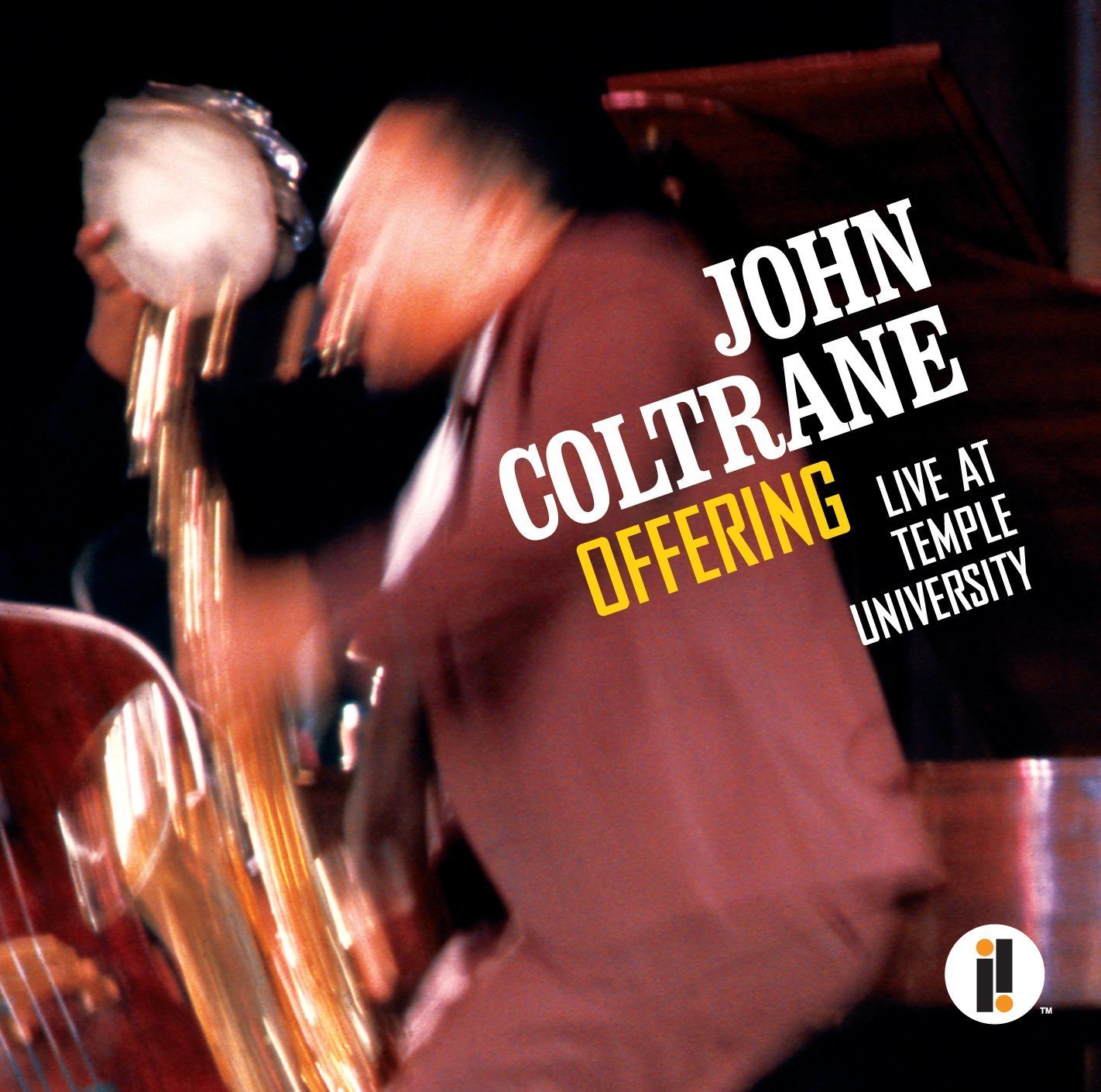Today, Sept 23, is a beautiful 88th birthdate of the late revered and intrepid saxophonist/composer John Coltrane, celebrated with the release of Offering, the first professionally prepared cd of his November 1966 concert at  Temple University. This is the most significant addition to Coltrane’s ouevre since the 2005 discovery by Library of Congress researcher Larry Appelbaum of the concert Trane did in 1957 with Thelonious Monk at Carnegie Hall. Coltrane fans won’t want to miss it. Uninitiated adventurers approaching this album may be shocked and/or awed.
Temple University. This is the most significant addition to Coltrane’s ouevre since the 2005 discovery by Library of Congress researcher Larry Appelbaum of the concert Trane did in 1957 with Thelonious Monk at Carnegie Hall. Coltrane fans won’t want to miss it. Uninitiated adventurers approaching this album may be shocked and/or awed.
If you don’t know: Coltrane had attained immortal status by his death at age 40 in 1967. He was so committed to exploring the potential of human expression from the base of jazz’s traditions, the greater scope of music from all over the world (Africa and India, especially) and the extraordinary technical skills he’d attained that he’d become a leader in the quest for esthetic and indeed spiritual freedom.
The Offering documents these aspects of his mission, as well as Coltrane’s unusual humility and generosity to his community: he allowed and even encouraged musicians not on his level — amateurs, really — to sit in. All this, his iconoclastic departure from conventional song form and the extremely vocal-like vocabulary he brought to his horns was new and controversial when Coltrane first did it, and still sets his later music beyond the taste of many listeners. Yet it opened the gates to much of what we take to be serious about improvisational music in every genre today.
Personally, I cannot say I understood John Coltrane’s music when I first heard him live in 1965, but I was profoundly affected by it. I had already learned from records about his preternaturally calm, seemingly methodical lyricism on Miles Davis’ Kind of Blue, his sinuous approach to Thelonious Monk’s stark and/or quirky melodies and his direct, somber embrace of the blues in general. I was enthralled by the velocity he brought to modal tears like “Impressions” and “India”but I didn’t know what to make  of the gaggle of percussionists who joined him onstage during his festival performance at Soldier Field in Chicago, or the ripping solo of his sideman, tenor saxophonist Archie Shepp.  But two years later I was shocked to find Coltrane’s  obituary in the Chicago Sun Times just as the el train I rode to work at Wrigley Field rolled into my stop that I turned right around and went home to spend all day listening to his album Live at the Village Vanguard Again (recorded in May ’66), which I’d received as a premium with my first DownBeat subscription.
Like The Offering, Live at the Village Vanguard Again featured Coltrane’s wife Alice playing piano and fellow saxophonist Pharoah Sanders. Like The Offering, it included a radically transformation of Coltrane’s hit “My Favorite Things,” and a transcendent version of his gorgeous ballad “Naima.” Coltrane’s sound on both these recordings is deep and rolling, but extends to urgent high-energy overblowing that may easily be considered strident. Sanders is a font of screaming, stuttering spits and harsh multi-phonics, too. Live at the Village Vanguard Again  is better recorded than The Offering, but so what? These people did not make music to be a perfect product for abject admiration or as background music; what they did was meant to reach some core of individual creativity, send a message, model a path that at least questioned and better yet led from ordinary life and unengaged responses. Simultaneously, unexpectedly and paradoxically, the music provides release and resolution. To me, every recording of Coltrane post 1961, after his associations with Miles  and Monk but starting with his collaboration with alto saxophonist, flutist and bass clarinetist Eric Dolphy has a purity and strength of purpose that embodies humane nobility.
is better recorded than The Offering, but so what? These people did not make music to be a perfect product for abject admiration or as background music; what they did was meant to reach some core of individual creativity, send a message, model a path that at least questioned and better yet led from ordinary life and unengaged responses. Simultaneously, unexpectedly and paradoxically, the music provides release and resolution. To me, every recording of Coltrane post 1961, after his associations with Miles  and Monk but starting with his collaboration with alto saxophonist, flutist and bass clarinetist Eric Dolphy has a purity and strength of purpose that embodies humane nobility.
That quality is a very beneficial thing to be exposed to and absorb.  It’s inspiring and heartening, exciting and fulfilling. It accepts no limits and foresees no end. I think it’s why I still and will always listen to John Coltrane.
Subscribe by Email | Subscribe by RSS | Follow on Twitter All JBJ posts |
[contextly_auto_sidebar id=”JwdiLwSkaF94MfVi07NVje4303KUuDNW”]
